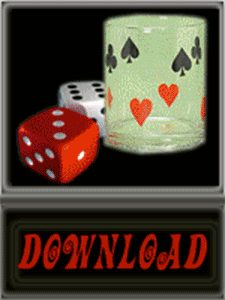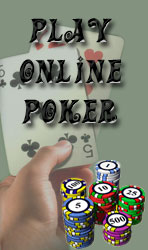Pokerwiner.com → Lessons of poker
BLUFFS WHEN ALL THE CARDS ARE OUT
When all the cards are out, you obviously can no longer semi-bluff. You have either made your hand or you haven’t. So all do not expect to win if you are called.
When you are sitting there knowing you have the worst hand, knowing you cannot win by checking, knowing you cannot win by calling your opponent’s bet, the only question is whether or not to try to bluff.
You should not if you think the chances your opponent will call are too great in relation to the pot odds you are getting. You should if you think your opponent will fold often enough for a bluff to show a profit.
If there is $100 in the pot, you should make a $20 bluff if you think your opponent will fold more than once in six times.
If there is $60 in the pot, you must assume your opponent will fold more than once in four times before you try to bluff.
If there is $140 in the pot, your opponent needs to fold more than once in eight times. But, of course, the larger the pot, the better pot odds your opponent is getting to call your bet and the more likely it is he will call with any kind of a fair hand.
Accurate assessment of your chances of pulling off a bluff comes, like so many advanced poker plays, only with experience.
You must first be able to read hand. You are obviously not going to bluff out an opponent with a lock or any sort of big hand. In general, the weaker you think your opponent’s hand is, the higher the chances your bluff will succeed.
Second, you must be able to read opponents. It’s generally easier to bluff out a timid opponent than a loose opponent, and it’s generally easier to bluff out a tough opponent than a weak one who looks for any reason to call, including the possibility that you might be bluffing.
In essence, you must consider your specific Opponent in each situation before deciding whether to try a bluff. Even the way in which play developed in previous hands can have a bearing on whether a bluff is now right or not.
BLUFFING AND POSITION
Your position can also affect the chances of a bluff’s success. In most games with tough players, I’ve found it easier to bluff if I’m first than if I’m second and my opponent has checked.
There are two reasons for this. If my opponent has checked to me, he knows he has shown weakness with his check, and when I bet, he knows he suspects I am trying to take advantage of his weakness.
So he’s likely to call with any kind of hand. And, if he has a really bad hand, he might very well have tried t bluff himself.
Since he checked instead, the chances are good he has a calling poker hand, and when I bet out on a bluff, he’s likely to call, even if he thinks he’s a small underdog.
So in situation on the end where your hand can’t win by checking but where you have reason to believe your opponent may be weak, a bluff in first position is more likely to succeed than a bluff in second position.
BLUFFING AGAINST COME HANDS
Sometimes both you and your opponent have been drawing to a flush or a straight. You don’t make your hand, but there’s a good chance your opponent didn’t make his either.
Because of earlier bets on the come, there may be a fair amount in the pot – say, $100 in a $10-$20 game. Now let’s say you are first, and you end up with an AJ high.
You think there’s a 55 percent chance your opponent made a legitimate hand, and there’s a 15 percent chance he has you beat “by mistake” with something like an A, K or an A, Q high.
In this spot you should bet because by betting you are likely to make your opponent throw away the A, K and A, Q high, thus improving your chances of winning from 30 percent to 45 percent.
In contrast, when you have a busted hand and you suspect your opponent does, too, you may not want to bluff if you end up making something like a small pair.
If you bet, your opponent will call with a legitimate hand, and he will fold without one. But if you check and then call, your opponent may bet his busted hands as well as his legitimate ones.
Thus, with your small pair you beat his bluffs, which you could not do if you came out casino betting yourself. Either way, of course, you lose to his legitimate hands.



